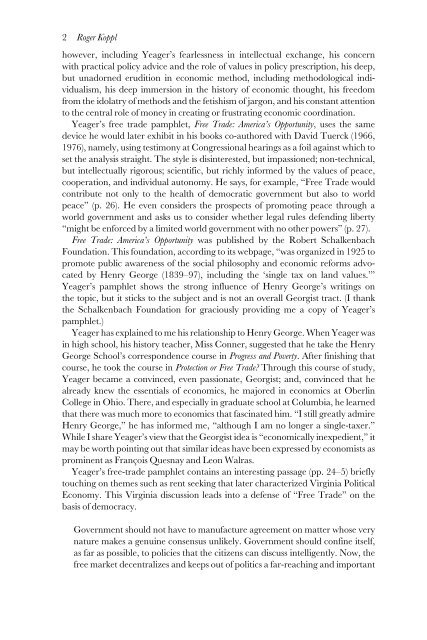Money and Markets: Essays in Honor of Leland B. Yeager
Money and Markets: Essays in Honor of Leland B. Yeager
Money and Markets: Essays in Honor of Leland B. Yeager
You also want an ePaper? Increase the reach of your titles
YUMPU automatically turns print PDFs into web optimized ePapers that Google loves.
2 Roger Kopplhowever, <strong>in</strong>clud<strong>in</strong>g <strong>Yeager</strong>’s fearlessness <strong>in</strong> <strong>in</strong>tellectual exchange, his concernwith practical policy advice <strong>and</strong> the role <strong>of</strong> values <strong>in</strong> policy prescription, his deep,but unadorned erudition <strong>in</strong> economic method, <strong>in</strong>clud<strong>in</strong>g methodological <strong>in</strong>dividualism,his deep immersion <strong>in</strong> the history <strong>of</strong> economic thought, his freedomfrom the idolatry <strong>of</strong> methods <strong>and</strong> the fetishism <strong>of</strong> jargon, <strong>and</strong> his constant attentionto the central role <strong>of</strong> money <strong>in</strong> creat<strong>in</strong>g or frustrat<strong>in</strong>g economic coord<strong>in</strong>ation.<strong>Yeager</strong>’s free trade pamphlet, Free Trade: America’s Opportunity, uses the samedevice he would later exhibit <strong>in</strong> his books co-authored with David Tuerck (1966,1976), namely, us<strong>in</strong>g testimony at Congressional hear<strong>in</strong>gs as a foil aga<strong>in</strong>st which toset the analysis straight. The style is dis<strong>in</strong>terested, but impassioned; non-technical,but <strong>in</strong>tellectually rigorous; scientific, but richly <strong>in</strong>formed by the values <strong>of</strong> peace,cooperation, <strong>and</strong> <strong>in</strong>dividual autonomy. He says, for example, “Free Trade wouldcontribute not only to the health <strong>of</strong> democratic government but also to worldpeace” (p. 26). He even considers the prospects <strong>of</strong> promot<strong>in</strong>g peace through aworld government <strong>and</strong> asks us to consider whether legal rules defend<strong>in</strong>g liberty“might be enforced by a limited world government with no other powers” (p. 27).Free Trade: America’s Opportunity was published by the Robert SchalkenbachFoundation. This foundation, accord<strong>in</strong>g to its webpage, “was organized <strong>in</strong> 1925 topromote public awareness <strong>of</strong> the social philosophy <strong>and</strong> economic reforms advocatedby Henry George (1839–97), <strong>in</strong>clud<strong>in</strong>g the ‘s<strong>in</strong>gle tax on l<strong>and</strong> values.’”<strong>Yeager</strong>’s pamphlet shows the strong <strong>in</strong>fluence <strong>of</strong> Henry George’s writ<strong>in</strong>gs onthe topic, but it sticks to the subject <strong>and</strong> is not an overall Georgist tract. (I thankthe Schalkenbach Foundation for graciously provid<strong>in</strong>g me a copy <strong>of</strong> <strong>Yeager</strong>’spamphlet.)<strong>Yeager</strong> has expla<strong>in</strong>ed to me his relationship to Henry George. When <strong>Yeager</strong> was<strong>in</strong> high school, his history teacher, Miss Conner, suggested that he take the HenryGeorge School’s correspondence course <strong>in</strong> Progress <strong>and</strong> Poverty. After f<strong>in</strong>ish<strong>in</strong>g thatcourse, he took the course <strong>in</strong> Protection or Free Trade? Through this course <strong>of</strong> study,<strong>Yeager</strong> became a conv<strong>in</strong>ced, even passionate, Georgist; <strong>and</strong>, conv<strong>in</strong>ced that healready knew the essentials <strong>of</strong> economics, he majored <strong>in</strong> economics at Oberl<strong>in</strong>College <strong>in</strong> Ohio. There, <strong>and</strong> especially <strong>in</strong> graduate school at Columbia, he learnedthat there was much more to economics that fasc<strong>in</strong>ated him. “I still greatly admireHenry George,” he has <strong>in</strong>formed me, “although I am no longer a s<strong>in</strong>gle-taxer.”While I share <strong>Yeager</strong>’s view that the Georgist idea is “economically <strong>in</strong>expedient,” itmay be worth po<strong>in</strong>t<strong>in</strong>g out that similar ideas have been expressed by economists asprom<strong>in</strong>ent as François Quesnay <strong>and</strong> Leon Walras.<strong>Yeager</strong>’s free-trade pamphlet conta<strong>in</strong>s an <strong>in</strong>terest<strong>in</strong>g passage (pp. 24–5) brieflytouch<strong>in</strong>g on themes such as rent seek<strong>in</strong>g that later characterized Virg<strong>in</strong>ia PoliticalEconomy. This Virg<strong>in</strong>ia discussion leads <strong>in</strong>to a defense <strong>of</strong> “Free Trade” on thebasis <strong>of</strong> democracy.Government should not have to manufacture agreement on matter whose verynature makes a genu<strong>in</strong>e consensus unlikely. Government should conf<strong>in</strong>e itself,as far as possible, to policies that the citizens can discuss <strong>in</strong>telligently. Now, thefree market decentralizes <strong>and</strong> keeps out <strong>of</strong> politics a far-reach<strong>in</strong>g <strong>and</strong> important
















